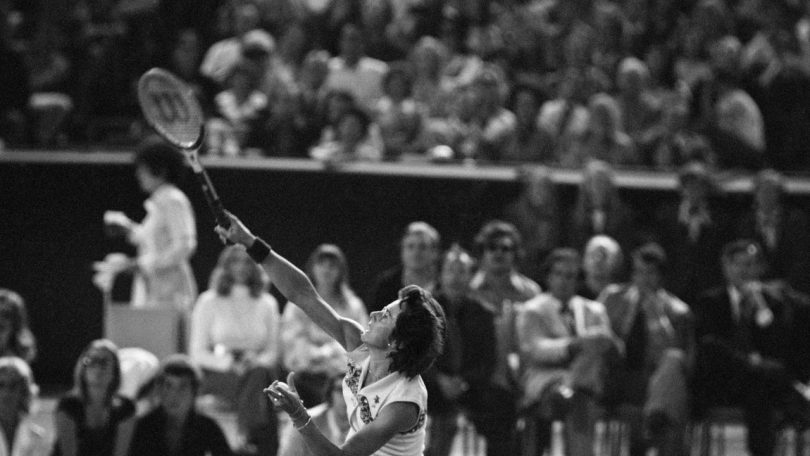King laid the groundwork for Serena Williams, Mary Lou Retton, Jackie Joyner-Kersee, Katie Ledecky, Nancy Lopez, Tracy Caulkins, Lisa Leslie, Ila Borders, Megan Rapinoe, Caitlin Clark, and other great female athletes. Professional women’s sports – including tennis, soccer, and basketball — is more popular today than ever. There are also now women playing on otherwise all-male college and professional baseball teams.
Born in Long Beach, California, Billie Jean Moffitt’s father was a fireman and her mother a homemaker. Her brother, Randy Moffitt, had a successful career in baseball as a major-league pitcher. At 10 years old she played shortstop on a softball team with girls four and five years older than she, one that won the Long Beach championship. She also enjoyed playing football. But her parents decided that she should pursue a more “ladylike” sport. Her father suggested tennis.
She picked up a racket at age 12, played on public courts, and was soon identified as a tennis prodigy. Unlike today’s promising young athletes, King did not have an elaborate network of coaches and clinics to nurture her talent. At fifteen, she made her debut at the US Championships. In 1961, at seventeen, she and Karen Hantze won the women’s doubles championship at Wimbledon. In 1966 King won her first Wimbledon singles title and was ranked number one.
King was ranked in the top ten in the world for seventeen years, beginning in 1960, and ranked number one five times between 1966 and 1972. She won a record twenty Wimbledon titles, six of them in singles (1966, 1967, 1968, 1972, 1973, and 1975), won the US Open four times (1967, 1971, 1972, and 1974), and won the Australian Open in 1968. In 1972 she won Wimbledon, the French Open and the US Open. In total, she won 67 singles titles, 101 doubles titles, and 11 mixed doubles titles, amassing almost $2 million in prize money after turning professional in 1968 and before retiring in 1983.
In 1974 she founded World Team Tennis and served as the player-coach of the Philadelphia Freedoms, becoming one of the first women to coach professional male athletes. She coached the US Olympic women’s tennis team in 1996 and 2000.
In the late 1960s professional women’s tennis was widely dismissed as a frilly sideshow. Male “amateur” tennis stars would get paid under the table, a practice that King denounced as “shamateurism,” while women athletes were not taken as seriously. For winning her first two Wimbledons, she received nothing except the $14 daily allowance.







